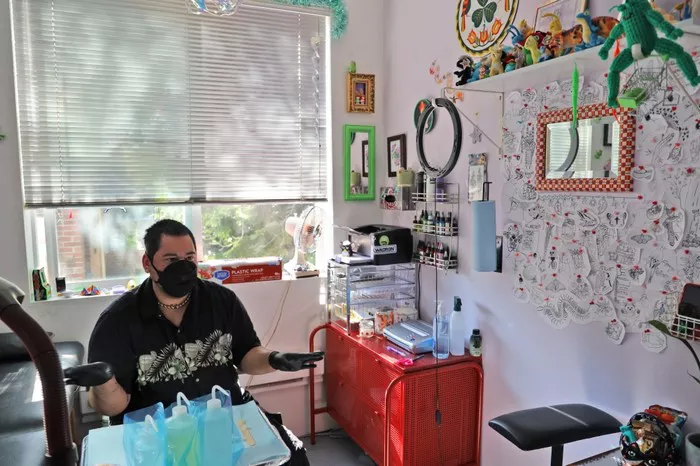Once seen as unconventional, tattoos are now a popular form of self-expression. As of 2023, 32% of Americans have tattoos, with 22% having more than one, according to Pew Research.
Seattle has long been known for its vibrant tattoo culture. The city hosts numerous tattoo shops and events like the Seattle Tattoo Expo. Now, some local artists are pushing for more inclusive and safe environments in their studios.
Seattle Tattoo Emporium, established in 1941 by Clarence J. Danzl, is considered the city’s oldest tattoo parlor. Danzl, a former U.S. Navy sailor, learned tattooing by practicing on his shipmates. Vyvyn Lazonga, a renowned artist known as “Seattle’s First Lady of Tattoos,” started her career at the Emporium and has spoken about the challenges of being a female artist in a male-dominated field.
Despite the progress in the industry, 75% of U.S. tattoo artists are male and 57% are white, according to Zippia. This lack of diversity is felt by artists like Raychelle Duazo, co-owner of Sorry Sorry Tattoo. As a queer Filipino American, Duazo found it hard to connect with others from her community in the industry.
“I was looking for someone like me to get tattooed by,” Duazo said. “Now, I can be that person for others.”
Duazo started as an apprentice at Sorry Sorry seven years ago, transitioning from an illustrator to a tattoo artist. She overcame challenges by relying on her community, which followed her into tattooing. Practicing on her community members helped her develop her unique style and build trust.
“There’s a lot that goes into creating a safe space,” Duazo said. “I made my Instagram personal because tattooing is personal. I want my clients to understand who I am and the values I stand for.”
Duazo uses her platform to advocate for marginalized communities, believing that tattoo artists should use their influence for good.
Ursula Rose and Lolli Morlock, co-owners of Bad Apple Tattoo, share this mindset. They left a previous shop due to exploitative practices and created their own collective-run business in 2020. Despite the challenges of opening during the COVID-19 pandemic, they have established a safe and equitable environment.
“We want people to feel safe and comfortable here,” Rose said. “It’s been cool seeing other shops adopt a collective style. This should be the standard in the future.”
Rose and Morlock advise against traditional apprenticeships, which often involve hazing. They prefer a more supportive approach, inviting beginners to shadow them.
Ari Shirazi, an independent artist who started his business in 2022, also focuses on creating a welcoming environment. His studio features a “Client Bill of Rights” to ensure customers feel respected and informed throughout the process.
“I want to relieve anxiety by giving clients knowledge and agency,” Shirazi said. “Tattooing is intimate, and it’s easy to misuse the power that comes with it. My goal is to put control back into my clients’ hands.”
As these artists advocate for change, they hope to see the industry in Seattle continue to evolve towards more inclusive and respectful practices.

